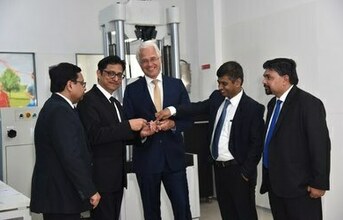
TÜV SÜD recently inaugurated the new Non-destructive testing (NDT) and Destructive testing (DT) laboratory in Noida. The fully equipped state-of-the-art laboratory can help businesses prevent incidents that are hazardous to human life and environment and mitigate financial as well as reputational losses, through standard as well as customised NDT and DT services. TÜV SÜD's specialists ensure products, material, manufacturing assets, components, equipment and systems continue to operate effectively and efficiently for a long time. The laboratory is fortified with world-class facilities to deliver reliable and accurate results that enable businesses to safeguard their operations and products.
TÜV SÜD will cater to conventional and advance NDT needs with state-of-the-art equipment and technical specialists conducting tests to ensure the sudden downtime and shutdown of the manufacturing plants and projects is reduced. TÜV SÜD provides testing in accordance with international standards such as UIC 960 (DIN 27201-7), EN ISO 9712 (superseding EN473), ISO 9712, PCN, SNT-TC- 1A, EN4179/NAS410 and API. NDT methods are implemented non-invasively and do not require the plant or process to shut down, thus being cost and time effective. Some of the testing services offered are: eddy current testing, advance ultrasound testing, long range ultrasound testing and corrosion testing to name a few. During inspection, the experts can also conduct a gap assessment and identify an organisation's NDT training and certifications needs. TÜV SÜD can offer trainings such as Level I & II training for conventional NDT techniques like RT, UT, MT, PT, VT & ET and Level I & II training for advance NDT techniques like PA/TOFD, LRUT, MFL, RMS and Tube inspection.
END


























